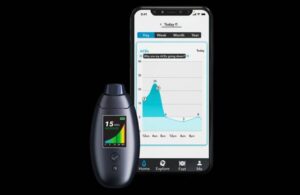
The agreement with Washington University School of Medicine (St. Louis) includes a two-year, $360,000 research grant from JDRF to test the efficacy of the Biosense handheld breath ketone monitor in persons with type 1 diabetes during usual care with insulin and with the addition of a sodium-glucose transporter inhibitor (SGLT2i) drug.
According to a news release, Dr. Janet McGill, a Washington University School of Medicine professor and recipient of the American Diabetes Association’s 2022 Outstanding Physician Clinician award, will serve as the principal investigator.
Readout Health launched Biosense in 2020 as a non-invasive option to capillary blood testing or urine testing for in-home biofeedback of fat oxidation levels based on nutrition and exercise. The company said that type 1 diabetes patients can be considered to be at considerable risk with elevated ketones, a problem potentially compounded by medications like SGLT2i if left unchecked.
“Routine monitoring of ketones may alert patients to impeding ketosis and help to prevent episodes of ketoacidosis,” McGill said in the release. “Ketone monitoring should be easy, non-invasive, low-cost, and accessible for repeated use to be effective.”
Biosense will be tested for its ability to detect ketosis in persons with type 1 diabetes during usual care and during usual care plus SGLTi therapy with the ultimate goal of reducing the risk of diabetic ketoacidosis (DKA). The first patients will be targeted during “late summer” through the JDRF grant awarded to Washington University School of Medicine at St. Louis.
“SGLT inhibitors are improving outcomes in glucose control, heart disease, and kidney disease in non-type 1 diabetes populations, but are rarely used in type 1 diabetes because they increase the risk of DKA,” JDRF Associate Director of Research Jonathan Rosen said. “Development of ketone monitoring technologies like Biosense are a critical part of the strategy to enable safe, effective use of SGLT inhibitors in type 1 diabetes.”
